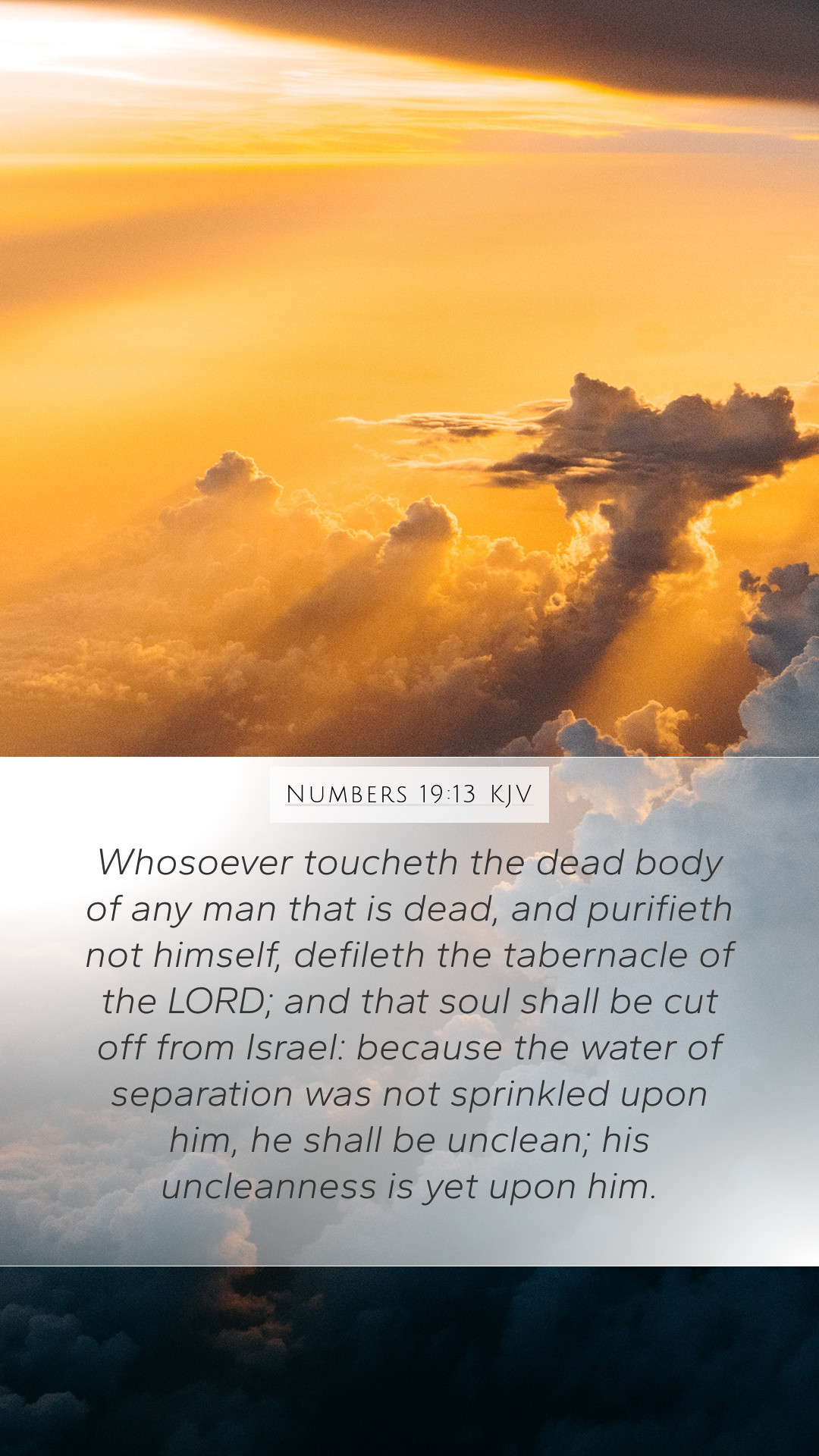Understanding Numbers 19:13
Bible Verse: Numbers 19:13
This verse speaks to the laws regarding ritual purity, specifically concerning those who have come into contact with the dead. The ritual is part of the overarching theme in Leviticus and Numbers concerning holiness and purity in the life of Israel.
Meaning of Numbers 19:13
Numbers 19:13 states, “Whoever touches the dead body of anyone and does not purify himself defiles the tabernacle of the Lord; that person shall be cut off from Israel.” This scripture emphasizes the importance of maintaining purity to be in fellowship with God.
Commentary Insights
- Matthew Henry: Matthew Henry emphasizes the gravity of defilement due to contact with death. He notes that death symbolizes the curse of sin, and thus, maintaining ritual purity is critical to signify one’s separation from sin and communion with God. He explains that the tabernacle represents God’s presence, and being cut off refers to a spiritual estrangement.
- Albert Barnes: Barnes discusses the implications of touching a dead body. He interprets this as indicative of the moral and spiritual decay that death represents. He views the purification process as essential for reinstating an individual’s relationship with God and participation in communal worship. He also connects this to the overarching laws for maintaining holiness in the Israelite community.
- Adam Clarke: Adam Clarke elaborates on the necessity of purification after death. He points out that these regulations serve as reminders of the impact of sin (which leads to death) and the need for atonement. Clarke notes that the focus is not merely on physical cleanliness but on a deeper spiritual state that believers must uphold to remain in right standing with God.
Scripture Analysis
This verse can be interpreted through a multi-dimensional lens, considering both the cultural context of ancient Israel and the theological principles it communicates today. The laws surrounding purity reflect the serious nature of sin and its consequences. It underscores how physical actions (like touching a dead body) can have spiritual ramifications.
Historical Context
In ancient Israel, the concept of purity was closely tied to the ability to enter worship spaces like the tabernacle. Touching a dead body was considered a significant defilement, requiring stringent rituals for purification.
Bible Verse Commentary and Exegesis
In considering the broader narrative of Scripture, we recognize that ritual purity laws serve to highlight God's holiness. This verse serves as a reminder that only those who are spiritually clean may approach Him and participate in fellowship. The call to holiness is pervasive throughout both the Old and New Testaments, culminating in Christ’s teachings on moral and spiritual integrity.
Application of Numbers 19:13 for Today
For modern believers, this verse illustrates the importance of repentance and spiritual renewal. Just as the Israelites had to physically purify themselves, today, we are called to seek spiritual cleansing through confession and faith. This practice maintains our relationship with God and allows us to engage fully in community worship.
Cross References
- Leviticus 10:10-11 - Instructions on distinguishing between holy and unholy.
- Hebrews 9:22 - The necessity of blood for purification.
- Romans 6:23 - The wages of sin is death, making the importance of spiritual life paramount.
Conclusion
Numbers 19:13 invites believers to reflect on their spiritual state and encourages them to pursue holiness diligently. This pursuit of purity not only enhances individual faith but also strengthens the collective community of believers.
Further Study
For those interested in deeper Bible study, consider exploring:
- How to interpret Bible verses through various theological frameworks.
- In-depth Bible verse analysis in group settings for richer understanding.
- Utilizing Bible study tools and resources for faithful interpretations.


